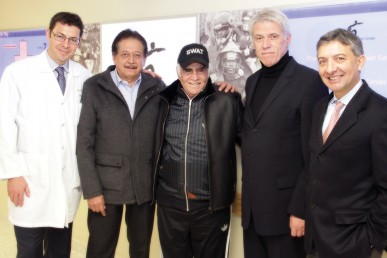Renowned Mexican singer recovering after robotic surgery

Vicente Fernández Gómez, center, with (L-R) UIC surgeon Jose Oberholzer, the singer’s friend and physician Roberto Esquivel Ruano, and UIC surgeons Pier Cristoforo Giulianotti and Enrico Benedetti. Photo: Kathryn Marchetti
Renowned Mexican singer Vicente Fernández Gómez traveled from his home country to undergo robotic surgery at the UI Hospital Nov. 8.
Fernández, who was discharged from the hospital Nov. 13, is expected to make a full recovery.
“I am very happy with my treatment — the doctors, nurses, staff and translators — everyone has been wonderful,” said Fernández, speaking in Spanish.
A tumor had been partially obstructing his left biliary duct. Traditional surgery would have required a large abdominal incision, possibly injuring the diaphragm and abdominal muscles and jeopardizing the artist’s long career.
Surgeons in Guadalajara realized the procedure was too complex for simple laparoscopy, so they referred Fernández to surgeons at UI Hospital, who have performed thousands of complex robotic-assisted procedures.
Using the da Vinci surgical system, UI Health surgeons made a few incisions just a few millimeters in length to accommodate the laparoscope and robotic arms to precisely control the movements of the surgical instruments inside the patient.
During the surgery, blood vessels in the left lobe of the liver were sealed and divided. The entire left lobe was then detached from the vena cava, the largest vein in the body, and separated from the right lobe.
The tumor was removed, and surgeons restored the digestive system using a segment of bowel that was then connected to the remaining liver.
The UI Health surgical team was led by Pier Cristoforo Giulianotti, the Lloyd M. Nyhus Professor of Surgery and chief of minimally invasive, general and robotic surgery. He was assisted by Francesco Bianco, assistant professor of clinical surgery.
The medical team included the singer’s personal physician, Roberto Esquivel Ruano; urologist and personal friend Luis Rodriguez Gutierrez; hepatologist and transplant surgeon Federico Mendoza Sanchez in Guadalajara; and UI Health surgeons José Oberholzer, Enrico Benedetti and Giulianotti.
Robotic-assisted surgery offers advantages over traditional surgery, including faster recovery, less blood loss and fewer post-surgical complications.
“The robot enhances human capabilities, allowing for more precise instrument maneuvers and providing a superior, magnified, 3-D field of vision,” said Giulianotti, an international pioneer in robotic general surgery.
Giulianotti has performed more than 2,000 robotic-assisted minimally invasive surgeries of the pancreas, lung, esophagus, colon, stomach, liver, gallbladder and kidney.
During the singer’s time in Chicago, officials presented him with keys to the city and renamed a stretch of 26th Street in Little Village in his honor.
